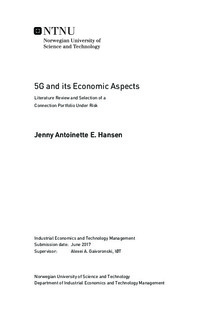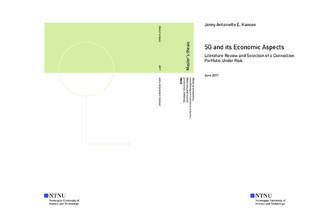| dc.description.abstract | In this master s thesis we explain how 5G is currently defined, identify the most important economic aspects of 5G, and formulate an optimization planning problem for a mobile network operator operating in the 5G context, by using portfolio theory. Our main intention is to provide an overview that can be used as a starting point for further studies of 5G economics.
Using existing literature about 5G as a starting point, we explore how 5G currently is defined, and how the recent literature address its economic and business related aspects. 5G is not standardized yet, but the literature shows that most actors and stakeholders agree on both the use cases and the actual requirements for 5G. We see that until now, most of the 5G literature is concerned with proposing technologies to be included in 5G, so that 5G can meet the requirements. Heterogeneous networks, device-to-device communication, software-defined networking, network function virtualization, cognitive radio, transmission over the millimeter frequency bands, advanced multiple-input multiple-output techniques and software-defined radios are examples of important technologies that are likely to characterize 5G.
An important finding is that there has not been conducted much dedicated research on the economic aspects of 5G yet. However, there are a few articles dedicated to this field, which are studying the profitability of proposed new technologies: device-to-device communication and the 5G heterogeneous networks. Certain economic aspects are also mentioned in technology-oriented publications, such as the increasing expenses the mobile network operators face, and the need for these costs to be at a reasonable level in the future. Cloud concepts with software-based implementations and virtualization technologies are described as promising solutions for the cost issues, along with lowered cell costs in the 5G heterogeneous networks. If the costs of deploying and operating base stations are lowered, the decision of deploying new base stations in rural areas will be easier to make. This have direct impact on socioeconomic development, for which connectivity is an important enabler. Further, there is a certain focus on green aspects in the literature, especially in terms of power consumption in the base stations. These considerations are also directly relevant for the economic context of 5G.
Regarding the 5G business perspective, we see that the improved network performance in 5G is likely to open up new business opportunities. In addition to an improved user-experience for existing services, new opportunities arise from applications that are first enabled when the network delay is minimized and the reliability is increased. This includes mission critical communications, a huge number of connected devices arising from the Internet of Things, and mobilization of different industries. The business context of 5G may also be characterized by new types of customers and partnerships.
Finally, as an example for further economic research of 5G, we provide a portfolio theory model for the planning of future 5G networks. In this model we show how portfolio optimization can be applied to formulate the following problem: How a mobile network operator can select an optimal portfolio of available connections to offer to its customers, to provide the necessary connections for the network traffic related to the customers' service demands, while also meeting their quality demands. The application of portfolio theory to allocate traffic in a mobile network is not novel. Our main contribution is to include the Quality of Experience aspect in this type of model, to make the model feasible for the planning of 5G mobile networks. | |

